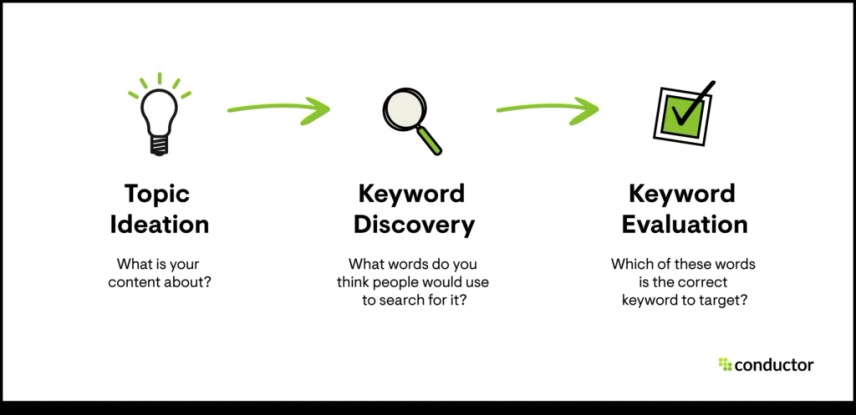Keywords are like little pieces of gold in the world of online content. They are the words or phrases that internet users type into search engines when looking for information. But how do we know which keywords are the best to use? That’s where keyword research comes in. In this article, we will explore the concept of keyword research and its importance in helping us optimize our content for search engines. So, whether you’re a seasoned blogger or just starting out in the world of digital marketing, get ready to uncover the secrets behind effective keyword research. Keyword research is the process of identifying and analyzing the words and phrases that people use to search for information on search engines. It is an essential component of search engine optimization (SEO) as it helps website owners understand what their target audience is searching for and optimize their content accordingly. By conducting keyword research, website owners can improve their website’s visibility in search engine results and drive more organic traffic.
Why is keyword research important?
Keyword research is important for several reasons:
Review contents
Enhances SEO
One of the main reasons why keyword research is important is that it enhances SEO. By understanding the keywords that are relevant to their target audience, website owners can optimize their website’s content, meta tags, and headings to rank better in search engine results. By incorporating these keywords into their content, website owners can increase their website’s visibility, drive more organic traffic, and ultimately improve their website’s search engine rankings.
Improves Content Relevance
Keyword research is also crucial for improving content relevance. By identifying the keywords that are related to their industry or niche, website owners can create content that addresses the needs and interests of their target audience. By creating relevant and high-quality content that incorporates these keywords, website owners can attract more visitors to their site and establish themselves as a trusted resource in their industry.
Increases Organic Traffic
Another benefit of keyword research is that it helps increase organic traffic to a website. When website owners optimize their content for relevant keywords, they are more likely to attract visitors who are actively searching for the information or products they offer. By targeting these specific keywords and providing valuable content, website owners can drive targeted traffic to their site, resulting in higher conversion rates and increased business opportunities.
Identifies Market Trends
Keyword research also helps website owners identify market trends and stay ahead of the competition. By analyzing the keywords that are popular among their target audience, website owners can gain valuable insights into consumer behavior, preferences, and interests. This information can be used to develop effective marketing strategies, create relevant content, and stay updated with the latest industry trends.
How to conduct keyword research
Now that we understand the importance of keyword research, let’s explore how to conduct it effectively:
Define Your Goals
The first step in conducting keyword research is to define your goals. What are you trying to achieve with your website or online presence? Are you looking to increase sales, drive more traffic, or establish yourself as an industry authority? By clearly defining your goals, you can tailor your keyword research to focus on the keywords that will help you achieve those objectives.
Brainstorm Potential Keywords
Once you have defined your goals, it’s time to brainstorm potential keywords. Start by thinking about the words and phrases that are most relevant to your industry, products, or services. Put yourself in the shoes of your target audience and consider what they would search for when looking for information or products like yours. This brainstorming process will help you generate a list of potential keywords to explore further.
Utilize Keyword Research Tools
To conduct keyword research more effectively, it’s recommended to utilize keyword research tools. These tools provide valuable data and insights about keywords, including search volume, competition, and keyword difficulty. Some popular keyword research tools include Google Keyword Planner, Semrush, Moz Keyword Explorer, Ahrefs Keyword Explorer, and KeywordTool.io. By using these tools, you can access accurate and up-to-date information about the keywords you are considering.
Analyze Competitor Keywords
Analyzing competitor keywords is another important step in conducting keyword research. By understanding what keywords your competitors are targeting, you can gain insights into their strategy and identify opportunities to differentiate yourself. Look at the top-ranking websites in your industry and identify the keywords they are optimizing their content for. This analysis will help you identify gaps or untapped keywords that you can target to attract more organic traffic.
Refine Your Keyword List
After conducting your initial keyword research, it’s important to refine your keyword list. Remove any irrelevant or low-volume keywords that are unlikely to drive significant traffic to your website. Focus on the keywords that have a good balance of search volume and competition. It’s also important to prioritize long-tail keywords, which are more specific and have a higher chance of driving targeted traffic. By refining your keyword list, you can ensure that you are targeting the most relevant and valuable keywords for your website.
Types of keywords
There are several types of keywords that website owners should be aware of. Understanding these different types can help you optimize your content and target the right audience. Let’s explore some common types of keywords:
Short-tail Keywords
Short-tail keywords, also known as head keywords, are short and generic keywords that typically consist of one or two words. They have high search volume but also high competition. Examples of short-tail keywords include “shoes,” “dresses,” or “digital marketing.” While targeting short-tail keywords can potentially drive a lot of traffic, it can be challenging to rank well for these keywords due to the high competition.
Long-tail Keywords
Long-tail keywords, on the other hand, are longer and more specific keyword phrases that typically consist of three or more words. They have lower search volume but also lower competition. Examples of long-tail keywords include “red running shoes for women,” “summer dresses for weddings,” or “digital marketing strategies for small businesses.” By targeting long-tail keywords, website owners can attract more targeted traffic and increase the chances of conversion.
Branded Keywords
Branded keywords are keywords that include the name or brand of a specific company or product. These keywords are typically used by users who are already familiar with the brand or looking for specific information about it. Examples of branded keywords include “Nike shoes,” “Apple iPhone,” or “Coca-Cola.” By targeting branded keywords, companies can increase brand visibility and attract users who are specifically interested in their products or services.
This image is property of cdn.sanity.io.
Non-branded Keywords
Non-branded keywords, on the other hand, are keywords that do not include any specific brand names. These keywords are typically used by users who are in the early stages of the buying process and are looking for general information or comparisons. Examples of non-branded keywords include “best running shoes,” “smartphone reviews,” or “soft drink brands.” By targeting non-branded keywords, companies can attract users who are in the research phase and increase the chances of converting them into customers.
Product-focused Keywords
Product-focused keywords are keywords that specifically target a particular product or category of products. These keywords are used by users who are actively looking to purchase a specific product or compare different options. Examples of product-focused keywords include “buy men’s running shoes,” “best budget smartphones,” or “organic skincare products.” By targeting product-focused keywords, companies can attract users who are ready to make a purchase and increase the chances of driving sales.
Customer-focused Keywords
Customer-focused keywords are keywords that target specific customer needs, pain points, or desires. These keywords are used by users who are looking for solutions to their problems or seeking products that align with their preferences. Examples of customer-focused keywords include “how to lose weight fast,” “home remedies for acne,” or “eco-friendly fashion brands.” By targeting customer-focused keywords, companies can position themselves as a solution provider and attract users who are actively seeking solutions to their problems.
Keyword research metrics
When conducting keyword research, it’s important to consider certain metrics that can help you evaluate the potential of a keyword. Let’s explore some common keyword research metrics:
Search Volume
Search volume refers to the number of times a keyword is searched for within a specific timeframe. This metric helps you understand the popularity and demand for a particular keyword. Higher search volume indicates higher potential traffic, but it also means higher competition. It’s important to strike a balance between search volume and competition to target keywords that will drive significant traffic to your website.
This image is property of www.oberlo.com.
Keyword Difficulty
Keyword difficulty measures the level of competition for a particular keyword. It gives you an idea of how difficult it will be to rank for that keyword in search engine results. Keyword difficulty is typically represented as a numerical score or a percentage. When conducting keyword research, it’s important to consider the keyword difficulty to assess your chances of ranking well for a particular keyword.
Click-through Rate (CTR)
Click-through rate (CTR) measures the percentage of users who click on a search result after seeing it in search engine results. A higher CTR indicates that more users find the search result appealing and click on it. When conducting keyword research, it’s important to consider the potential CTR for a particular keyword to assess its effectiveness in driving traffic to your website.
Cost Per Click (CPC)
Cost per click (CPC) represents the amount that advertisers are willing to pay for a particular keyword in pay-per-click (PPC) advertising campaigns. Higher CPC indicates that advertisers are willing to pay more for that keyword, which often indicates higher competition. When conducting keyword research, it’s useful to consider CPC to understand the commercial intent of a keyword and its potential value for advertisers.
Keyword Intent
Keyword intent refers to the underlying goal or intention of a user when they search for a particular keyword. Understanding keyword intent is crucial for delivering relevant and targeted content to your audience. Common types of keyword intent include informational (seeking information), navigational (looking for a specific website), transactional (ready to make a purchase), or commercial (comparing options before making a decision).
Keyword research best practices
Now that we have explored the different aspects of keyword research, let’s discuss some best practices to maximize its effectiveness:
This image is property of www.demandjump.com.
Consider Relevance
When conducting keyword research, always prioritize relevance. Choose keywords that are highly relevant to your industry, products, or services. By targeting relevant keywords, you can attract users who are genuinely interested in what you have to offer and increase the chances of conversion.
Analyze User Intent
When selecting keywords, it’s crucial to consider user intent. Think about what your target audience is looking for when searching for specific keywords. Are they seeking information, comparing products, or ready to make a purchase? By understanding the user intent, you can create content that aligns with their needs and interests.
Utilize Long-tail Keywords
Long-tail keywords are often less competitive and more specific than short-tail keywords. By targeting long-tail keywords, you can attract more targeted traffic and increase the chances of conversion. Long-tail keywords often have higher purchase intent and can drive higher-quality traffic to your website.
Focus on Non-branded Keywords
While branded keywords can be valuable for increasing brand visibility and attracting brand loyalists, it’s important to also focus on non-branded keywords. Non-branded keywords can help you expand your reach and attract users who are in the initial research phase. By targeting non-branded keywords, you can establish yourself as a trusted resource in your industry and increase your chances of converting users into customers.
Consider Local SEO
If you have a local business or serve a specific geographical area, it’s important to consider local SEO when conducting keyword research. Target keywords that include location-specific terms to attract users who are looking for businesses or services in a particular area. Local SEO can help you increase your visibility in local search engine results and attract customers who are nearby.
Stay Updated with Market Trends
Keyword research is an ongoing process that requires staying updated with market trends. Consumer behavior, preferences, and search patterns can change over time. It’s important to regularly revisit your keyword research and make adjustments based on the latest market trends. By staying updated, you can ensure that your website remains relevant and continues to attract organic traffic.
Common keyword research mistakes to avoid
While conducting keyword research, it’s important to be aware of common mistakes that can hinder your efforts. Let’s explore some common keyword research mistakes to avoid:
Ignoring User Intent
One of the most common mistakes in keyword research is ignoring user intent. Focusing solely on search volume or competition without considering what the user is looking for can result in irrelevant traffic and low conversion rates. Always prioritize keywords that align with user intent and create content that addresses their needs and interests.
Overlooking Long-tail Keywords
Many website owners make the mistake of overlooking long-tail keywords in favor of short-tail keywords with high search volume. Long-tail keywords can be highly valuable as they often have lower competition and higher conversion rates. Don’t discount the potential of long-tail keywords and incorporate them into your keyword research strategy.
Relying Solely on Search Volume
While search volume is an important metric to consider, it should not be the sole determining factor when selecting keywords. High search volume often indicates higher competition, making it more challenging to rank well for those keywords. Strike a balance between search volume and competition to target keywords that have a good chance of driving significant traffic to your website.
Not Analyzing Competitor Keywords
Analyzing competitor keywords is a crucial step in keyword research. By understanding what keywords your competitors are targeting, you can identify gaps or untapped opportunities. Don’t neglect competitor analysis and leverage it to your advantage when conducting keyword research.
Neglecting Local SEO
If you have a local business or serve a specific geographical area, neglecting local SEO can limit your visibility in local search engine results. Be sure to include location-specific keywords in your research and optimize your website accordingly. By focusing on local SEO, you can attract customers who are nearby and increase foot traffic to your business.
Keyword Research Tools
To conduct effective keyword research, it’s recommended to utilize keyword research tools. These tools provide valuable data and insights that can help you identify the right keywords for your website. Let’s explore some popular keyword research tools:
Google Keyword Planner
Google Keyword Planner is a free tool provided by Google that helps you discover new keywords and estimate their search volume. It provides data on search volume trends, competition, and suggested bid ranges for keywords in Google Ads. Google Keyword Planner is particularly useful for conducting keyword research for Google Ads campaigns.
Semrush
Semrush is a comprehensive SEO and marketing tool that offers a wide range of features, including keyword research. It provides data on search volume, competition, keyword difficulty, and related keywords. Semrush also offers competitive analysis features, allowing you to analyze your competitors’ keywords and strategies to gain a competitive edge.
Moz Keyword Explorer
Moz Keyword Explorer is another popular keyword research tool that provides insights into keywords’ search volume, competition, and opportunity. It also offers features like keyword difficulty analysis, SERP analysis, and keyword suggestions. Moz Keyword Explorer is known for its user-friendly interface and comprehensive keyword data.
Ahrefs Keyword Explorer
Ahrefs Keyword Explorer is a powerful keyword research tool that offers extensive data on search volume, keyword difficulty, click-through rates, and more. It also provides detailed SERP analysis, backlink analysis, and competitor analysis features. Ahrefs is known for its robust data and is often used by SEO professionals and marketers.
KeywordTool.io
KeywordTool.io is a keyword research tool that provides keyword suggestions for various search engines, including Google, YouTube, Amazon, and Bing. It offers a wide range of keyword data, including search volume, competition, and cost-per-click (CPC) estimates. KeywordTool.io is particularly useful for researching long-tail keywords and optimizing content for specific platforms or marketplaces.
Conclusion
Keyword research plays a crucial role in improving a website’s visibility, attracting organic traffic, and optimizing content for search engines. By conducting comprehensive keyword research, website owners can gain valuable insights into their target audience’s search behavior and preferences. Utilizing keyword research tools, analyzing competitor keywords, and staying updated with market trends are all important steps in conducting effective keyword research. By following best practices and avoiding common mistakes, website owners can optimize their content, attract the right audience, and drive business growth.































